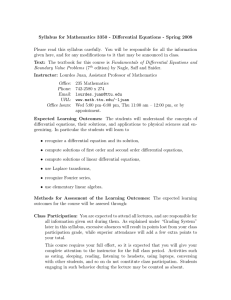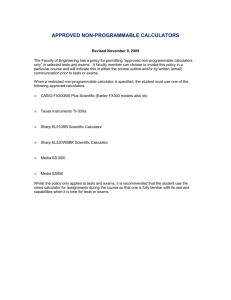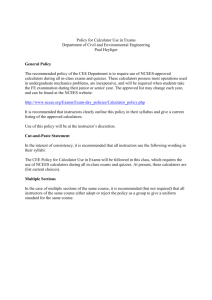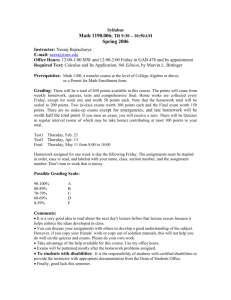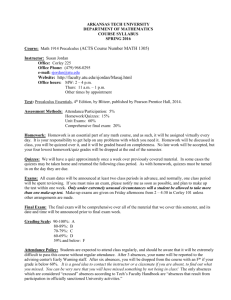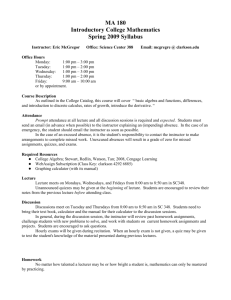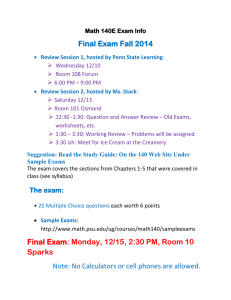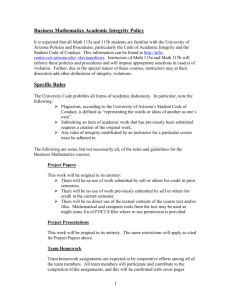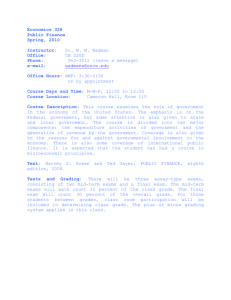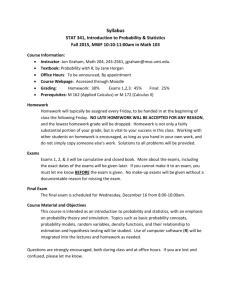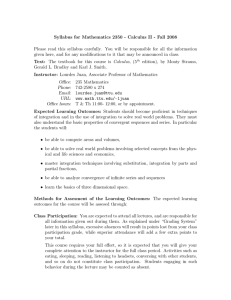Syllabus for Mathematics 2360 - Linear Algebra - Spring 2010
advertisement
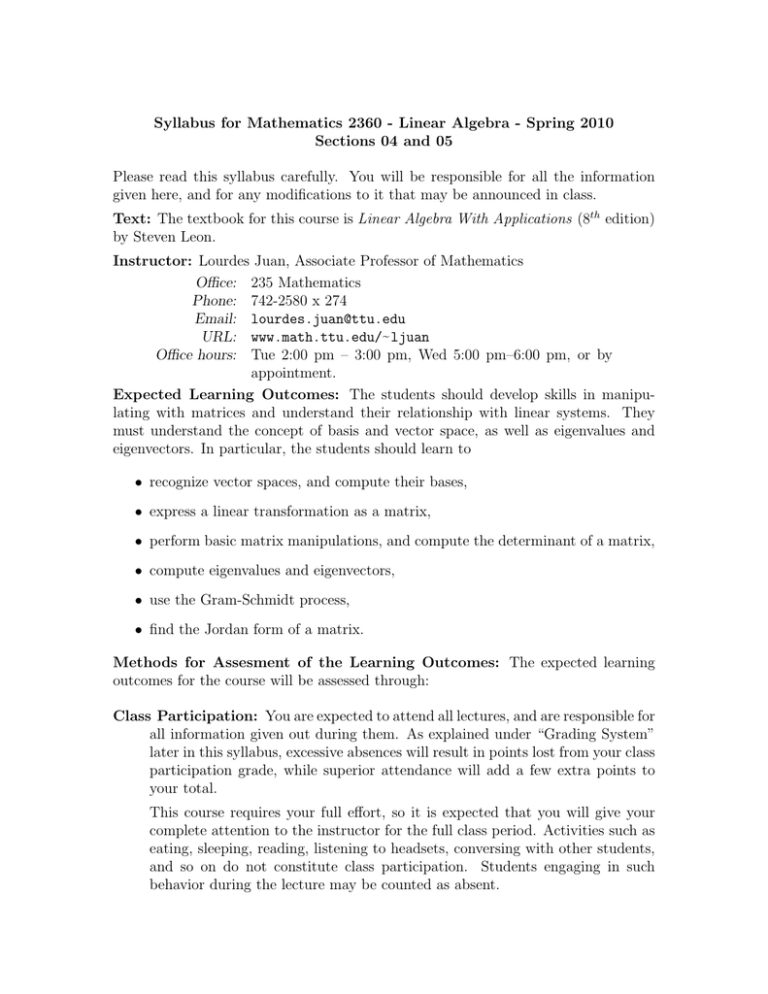
Syllabus for Mathematics 2360 - Linear Algebra - Spring 2010 Sections 04 and 05 Please read this syllabus carefully. You will be responsible for all the information given here, and for any modifications to it that may be announced in class. Text: The textbook for this course is Linear Algebra With Applications (8th edition) by Steven Leon. Instructor: Lourdes Juan, Associate Professor of Mathematics Office: 235 Mathematics Phone: 742-2580 x 274 Email: lourdes.juan@ttu.edu URL: www.math.ttu.edu/ e ljuan Office hours: Tue 2:00 pm – 3:00 pm, Wed 5:00 pm–6:00 pm, or by appointment. Expected Learning Outcomes: The students should develop skills in manipulating with matrices and understand their relationship with linear systems. They must understand the concept of basis and vector space, as well as eigenvalues and eigenvectors. In particular, the students should learn to • recognize vector spaces, and compute their bases, • express a linear transformation as a matrix, • perform basic matrix manipulations, and compute the determinant of a matrix, • compute eigenvalues and eigenvectors, • use the Gram-Schmidt process, • find the Jordan form of a matrix. Methods for Assesment of the Learning Outcomes: The expected learning outcomes for the course will be assessed through: Class Participation: You are expected to attend all lectures, and are responsible for all information given out during them. As explained under “Grading System” later in this syllabus, excessive absences will result in points lost from your class participation grade, while superior attendance will add a few extra points to your total. This course requires your full effort, so it is expected that you will give your complete attention to the instructor for the full class period. Activities such as eating, sleeping, reading, listening to headsets, conversing with other students, and so on do not constitute class participation. Students engaging in such behavior during the lecture may be counted as absent. 2 Homework: It is absolutely essential to work a large number of problems on a regular basis. Homework will not be collected but problems will be suggested every lecture. The suggested problems are the bare minimum for most students to gain basic familiarity with the material. As manager of your own education, it is up to you to work whatever additional problems may be necessary for you to achieve a good understanding of the subject. Quizzes: There will be a quiz each Thursday of non-exam weeks based on the problems suggested in class. There is no make-up for missed quizzes. The lowest quiz will be dropped. Testing: The exams will test understanding of some of the theoretical ideas and additional techniques presented in the lectures. These are part of the course and should be learned along with the basic problem-solving techniques used in the homework problems. Examinations will be given during the regular lecture hour on the following dates, covering all sections. Exam 1 Exam 2 Thursday, Feb 18 Thursday, April 1 The final examination will be held for section 04 (TR 11: 00 a.m.) on Friday, May 7, from 1:30 p.m. to 4:00 p.m. and for section 05 (TR 12:30 p.m.) on Saturday, May 8, from 10:30 a.m. to 1:00 p.m. University regulations require that you take it at that time. It will cover all sections listed in the class schedule. Please note that all tests will be comprehensive. All tests must be taken at the scheduled times, except in extraordinary circumstances. Please do not arrange travel plans that prevent you from taking any of the exams at the scheduled time. If you cannot take a test at the scheduled time, you should contact me in advance. Check the grading of your exams carefully when they are returned; all grading errors should be brought to my attention as soon as possible. Grading system: There will be 150 points possible as follows: Points: 15 25 30 30 50 150 Percent: 10 16.7 20 20 33.3 100 Class participation Quizzes Exam 1 Exam 2 Final exam Total possible 3 The class participation grade will be determined as follows. If you have 4 absences or less, you will receive the full 15 points of class participation credit, plus 1.5 bonus points for each class fewer than 4 missed (thus you can earn up to 4.5 bonus points for superior class participation). The 5th through 10th absences will each subtract 2.5 points from the 15 points of class participation grade. Course grades will be determined according to the following scale: Total points: 131.5−150.0 116.25−131.0 101.25−116.0 82.5−101.0 0.0−82.25 Percent: 87.50−100.00 77.50− 87.34 67.50− 77.34 55.00− 67.34 0.00− 54.84 Grade: A B C D F Grades are calculated by computer but errors in recording or entering scores can occur. Please keep your tests and homework so that you can verify the posted totals at the end of the semester, if you think that an error may have occurred. Withdrawal Policy: The last day to drop a course is March 11. First-time freshmen entering fall 2004 or after can only have 4 W’s during their academic college career. Transfer students can only have 3 W’s. Grade of Incomplete: The grade of “I” is a special-purpose grade given when a specific task needs to be completed to finish the coursework. This is typically a term paper or other special assignment, so rarely makes sense in a mathematics course. An “I” cannot be given to avoid receiving a low grade. Calculators: This is a course of mathematical concepts and techniques, not a course of mechanical computation, so we will have little use for calculators. A few of the homework problems may require the use of a basic scientific calculator, which can perform numerical calculations, and can give values of the trigonometric, inverse trigonometric, exponential, and logarithm functions. Such a calculator can be purchased at discount stores for a few dollars. A basic scientific calculator can be used during exams, although it is not necessary to have one. However, use of graphing or programmable calculators during exams is prohibited. Use of any calculator with the capability to store formulas or other information is also prohibited during exams. Cell phones, laptos and other electronic devices: must be turned off before entering the classroom - there are no exceptions. Cell phone calculators cannot be used in exams. Anyone using such devices in class will be counted absent. Academic Misconduct: Cases of academic misconduct are inexcusable and will be punished to the maximum extent possible under University regulations. Don’t do it. Students with Disabilities: Any student who, because of a disability, may require special arrangements in order to meet the course requirerments should contact 4 the instructor as soon as possible to make any necessary arrangements. Students should present appropriate verification from Student Disability Services during the instructor’s office hours. Please note instructors are not allowed to provide classroom accommodations to a student until appropriate verification from Student Disability Services has been provided. For additional information you may contact Student Disability Services at 335 West Hall or 806-742-2405. Observance of Religious Holiday: A student who intends to observe a religious holy day should make that intention known in writing to the instructor prior to the absence. A student who is absent from classes for the observance of a religious holy day shall be allowed to take an examination or complete an assignment scheduled for that day within a reasonable time after the absence.

